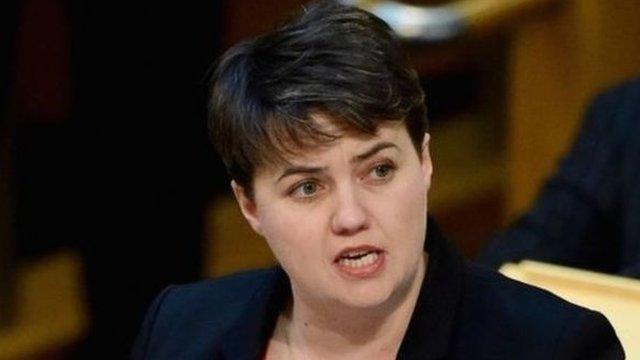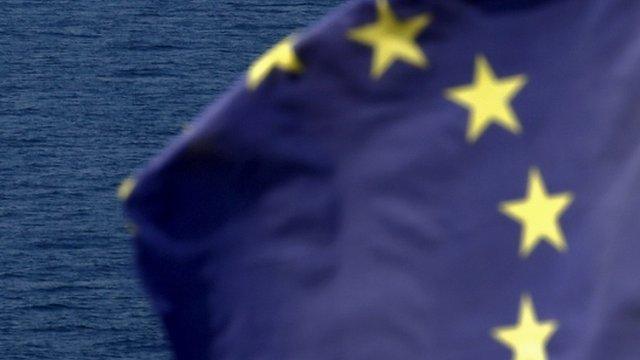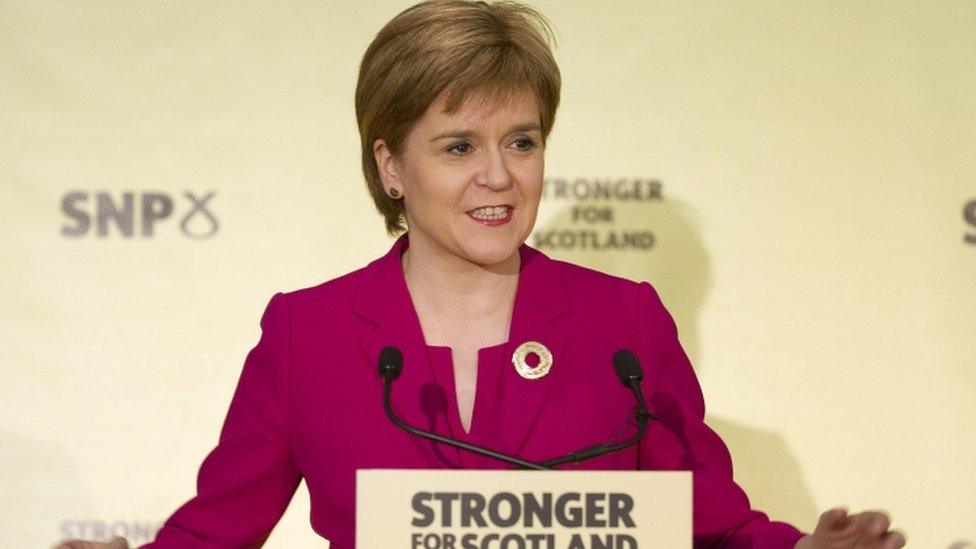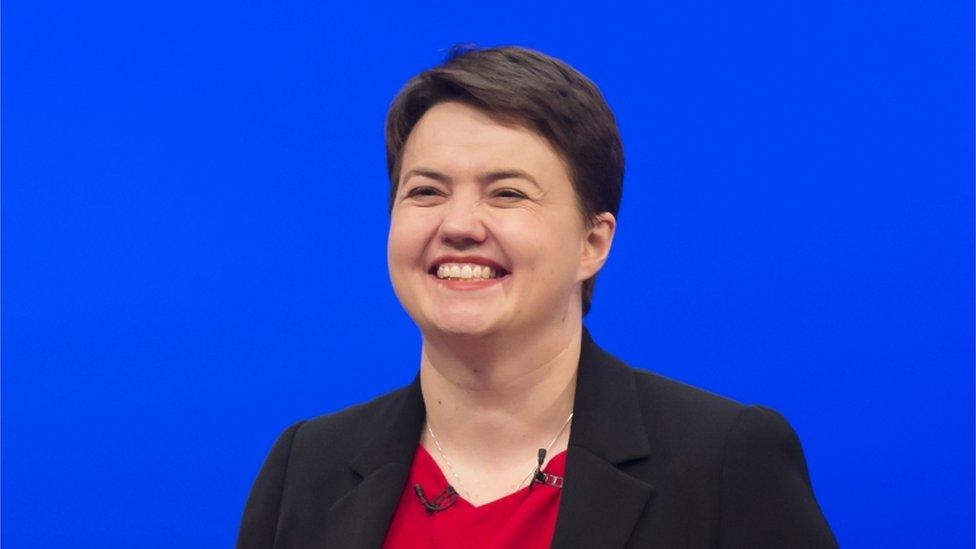Talking Europe
- Published

Ruth Davidson has been in Brussels talking about the future of Britain in the EU
The talk is still of referendum. (Actually, the gossip is uniformly porcine - but bear with me.) The conversation in the great and noble city of Dundee last night was of the Scottish referendum, a year on.
I was invited to take part in a revisiting of the Five Million Questions project, external by Dundee University. We didn't quite get through five million but the large audience had umpteen issues to pose. I found the discussion thoughtful and valuable.
Today, from Ruth Davidson, the talk turns to another plebiscite: on the European Union. The Scottish Conservative leader is in Brussels arguing that the positive case for the EU must be put, starting soon.
But Ms Davidson too is still harking back to the event of 18 September 2014. The EU referendum, she avers, leaves her "in a very different frame of mind" to the circumstances surrounding the Scottish ballot.

How so? The Scottish version, she argues, was about identity: "about how we felt as Scots, as Brits."
She notes en passant that there were other elements - "the argument about pounds and pence, of currency and central banks, of balance of trade and the dry economic statistics".
I seem to remember Osborne, G. and sundry other Conservatives making rather a lot of those "dry economic statistics" but no matter. Let us accept, for the sake of argument, Ms Davidson's case that the Scottish choice involved identity and the dismal science in balance.
By contrast, she says that the EU poll - for her - will not be "a question of personal or national identity."
Again, maybe so - but is that equally the case for the party's UKIP opponents: those who might truly be called the genesis of the EU referendum? Is not their fundamental case that British sovereignty, British identity has been eroded by EU membership?
'Bubble under'
Ms Davidson says, rightly, that it is 40 years since the question of EU membership was put to the people of these islands. However, a critic might note that the much older Union that is the UK had never been subject to direct plebiscite until September last year. One could argue that it was an issue at successive General Elections in Scotland but it had not been at the core of a single, decisive ballot.
So I do not think one can say, without equivocation, that the passage of time alone justifies a constitutional referendum. Rather, it must be popular disquiet with the prevailing governance arrangements.

To be fair, Ms Davidson acknowledges that when she says that sidestepping a referendum now would "only allow for more resentment to bubble under the surface".
Further, I accept her case that - for many people (but see above) - identity is not at issue in the EU choice. For people in Scotland, the degree of passion, of engagement will, I suspect, be well below that of the Scottish referendum.
So what might sway the choice? There is evidence that people in Scotland are more supportive of EU membership than those south of the Border. Somewhat more positive about Europe.
But that is as far as it goes. Scotland is not uniformly signed up to the European project. Scotland is not universally communautaire. Scots do not solemnly salute the Twelve Stars nor retire to bed with the Ode to Joy stirring their aural receptors.
If they are to be convinced to back the EU, it will be those "dry economic statistics", either way. They will heed those who say the EU is a scandalous waste of public resources. Or they will listen to those - like Ms Davidson - who say that the EU, as a trading market, offers an enormous opportunity to Scottish firms. She is eager to make a positive case for the EU.
The Scottish Tory leader forecasts that productive reforms will emerge from Mr Cameron's discussion with his EU counterparts. I must confess I do not see that process as decisive either way.
Firstly, it seems likely that the gains will be limited. The big EU countries are sympathetic to Mr Cameron's dilemma. They want Britain to stay. But there are limits. They weary of Britain's attitude. They have Eurosceptics of their own. They wonder whether Treaty revision or even substantive change short of that is feasible, given the need to keep everyone onside.
Secondly, is public opinion driven entirely by the reforms sought by Mr Cameron? Is it not more likely that it will involve a fundamental choice - in or out? Influenced by the Cameron process, yes, but not determined by it.
'Less convinced'
Then another point, which was raised in the Dundee discussions last night and has been aired on this site many, many times. Would Brexit without Scottish consent lead automatically or swiftly to a further referendum on Scottish independence?
In one way, I can see the logic. Scotland's constitutional position, her governance, would have been altered substantially - without the backing of her people.
But remember always that Nicola Sturgeon is not obsessed with constitutional purity. She wants to win next time. Would EU exit offer a sufficient push to take the 45 over the line?
I have my doubts although my fellow panellist last night, Professor Nicola McEwen of Edinburgh University, noted that the most avid Euro enthusiasts had tended to be less convinced by Scottish independence - and might arguably be inclined to switch.
But would there be sufficient numbers in that category? Would Brexit drive people towards independence - or create a climate of uncertainty in which further constitutional change might be unwelcome?
Back to Ms Davidson. She insists that every individual Conservative MSP will be free to follow their conscience in choosing which side to support in the EU referendum.
Further, she backed cross-party and no-party joint campaigns, noting that Conservative Party resources would not be devoted to such an endeavour.
This, of course, reflects the potential division within the Tories. The SNP said it meant her offer of stressing the "positive case" for the EU was hollow. Ms Davidson dissents, saying it is "fair play".
Trident and the economy
It all calls to mind Kezia Dugdale, the Scottish Labour leader, and her talk of a similar conscience clause for Labour members in the event of a second independence referendum.
Ms Davidson, to be clear, implied, as David Cameron has done, that such an option in the EU ballot would not be available to ministers in the UK Government. Labour is not presently troubled with such a dilemma.
What to make of Ms Dugdale's remarks? I believe there to be much, much less to them than meets the eye. I think she was simply acknowledging, perhaps a little clumsily, that her party has supporters who also backed independence. So much is basic arithmetic.
Beyond that, I think she was saying that - as with issues like Trident and the economy - Labour should be open to a range of ideas. I do not believe for a second she was paving the way for a change of stance on the constitution. I think she was simply eager to appear consensual and open. Such are the perils of leadership.
- Published22 September 2015
